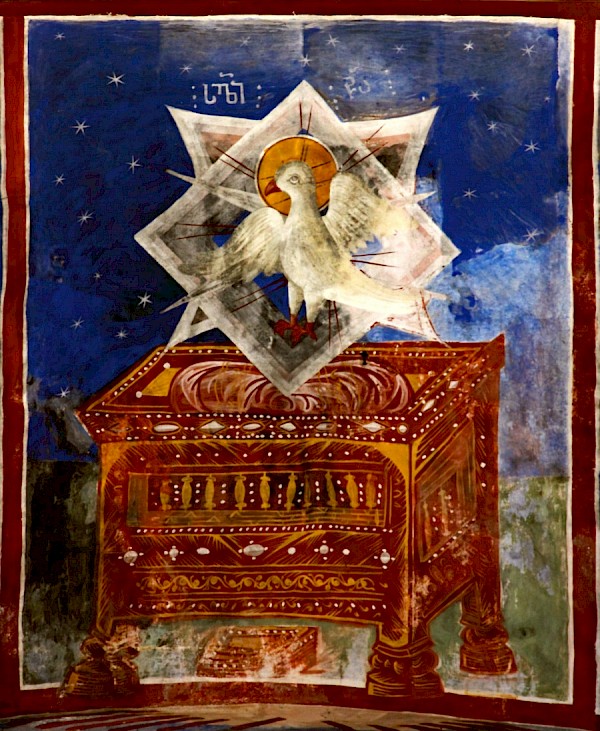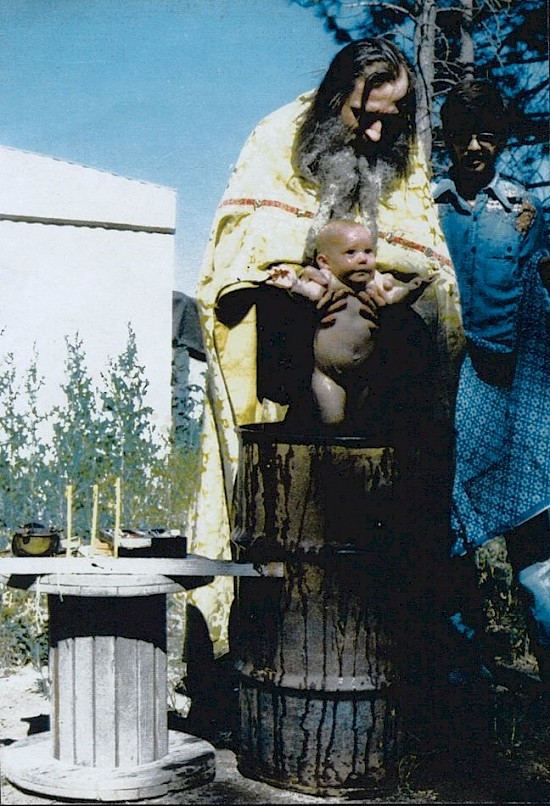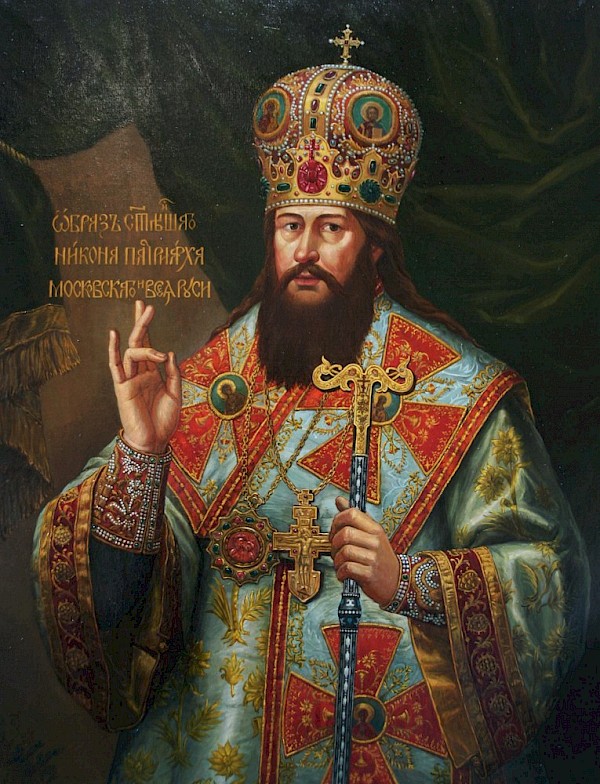
A Lecture given by Fr. Seraphim at the Youth Conference of the Russian Orthodox Church Outside of Russia, San Francisco, August 3, 1981.
Every Orthodox Christian is placed between two worlds: this fallen world where we try to work out our salvation, and the other world, heaven, the homeland towards which we are striving and which, if we are leading a true Christian life, gives us the inspiration to live from day to day in Christian virtue and love.
But the world is too much with us. We often, and in fact nowadays we usually forget the heavenly world. The pressure of worldliness is so strong today that we often lose track of what our life as a Christian is all about. Even if we may be attending church services frequently and consider ourselves “active” church members, how often our churchliness is only something external, bound up with beautiful services and the whole richness of our Orthodox tradition of worship, but lacking in real inner conviction that Orthodoxy is the faith that can save our soul for eternity, lacking in real love for and commitment to Christ, the incarnate God and Founder of our faith. How often our church life is just a matter of habit, something we go through outwardly but which does not change us inwardly, does not make us grow spiritually and lead us to eternal life in God.
21.06.2018Read more

The great monastic movement which began with St. Sergius, the great Abba of the Northern Thebaid, came to an end with the conclusion of the 17th century. New historical conditions – chiefly the Old Believer schism and the Westernizing reforms of Peter I – made no longer possible that harmony between the ascetic fervor of the best sons and daughters of Russia, and the profound piety of the believing Russian people, which led to the creation of innumerable new monasteries and convents under the inspiration of the Byzantine monastic ideal. We have seen, indeed, that the end of the period of the Northern Thebaid is one of decline – but it is a decline only by comparison with the astonishing monastic blossoming of the 14th to 16th centuries; by comparison with almost any other Orthodox land or period, the 17th century Russian monastic movement would have to be called a flourishing one that produced at least 45 canonized Saints1 (and many were never canonized owing to 18th-century conditions) and a large number of new monasteries.
At the end of the 18th century, a new great epoch of monasticism began with the great Elder Paisius Velichkovsky, the Abba of a new monastic movement whose current has not entirely died out even in our own times. That must be the subject of another book.
20.06.2018Read more

Hieroschemamonk Anthony Bulatovich’s booklet differs significantly from Schemamonk Ilarion’s book, Na Gorakh Kavkaza (In the Mountains of Caucasia), in the defense of which it is written. Schemamonk Ilarion had as his primary intention to praise the "Jesus Prayer"and to convince his contemporary ascetics to practise this monastic activity, which is so often neglected today. This intention is altogether praiseworthy. Everything that has been written by the fathers on the Jesus Prayer is beneficial, as Christians should be reminded. Those monks who would want to lessen the significance of the Jesus Prayer and all other spiritual activities passed down by the fathers are worthy of reproach. Nonetheless, a correct undertaking does not stand in need of incorrect means, and the patristic tradition of the Jesus Prayer has sufficient sound reasons in its favour so that one need not resort to superstitious arguments. Unfortunately the Elder Ilarion did not avoid this and he added his own sophistries to the many patristic and salvific reflections on the benefit and meaning of the Jesus Prayer. He took it into his mind to argue that the name of Jesus is God Himself.
13.06.2018Read more

Pronounced at the opening of the Russian Orthodox Icon Society on 26 january 1965 in San Francisco.
Iconography began on the day our Lord Jesus Christ pressed a cloth to His face and imprinted His divine-human image thereon. According to tradition, Luke the Evangelist painted the image of the Mother of God; and, also according to tradition, there still exist today many Icons which were painted by him. An artist, he painted not only the first Icons of the Mother of God, but also those of the holy Apostles Peter and Paul and, possibly, others which have not come down to us. Thus did Iconography begin.
05.06.2018Read more

Святой Дух. Фреска монастыря Гелати, Грузия.
Metropolitan Antony wrote this article in the 1920’s, shortly after he left the Crimea and joined the Russian emigration. Religious feelings and strivings were coming to life again among Russians at that time under the influence of the afflictions they had undergone. At this time Vladika Antony considered it essential to elucidate the Church’s teaching about the Holy Spirit. This article was originally published by the American YMCA Press in Paris [in 1927 as "Tserkovnoye ucheniye o Svyatom Dukhe"], but the edition is now extremely rare1. The workings of the Holy Spirit, as described here by this twentieth century Church Father in accordance with the true, traditional Orthodox teaching, will be seen to be very different from the delusions of the contemporary “charismatic movement”.
Misunderstandings2
At the present time many completely untrained writers and thinkers have acquired an itch for theologizing about the most abstruse and abstract questions. They all want to say something new and profound, and, in addition to that, to hint at how unsatisfactory the Church’s teaching is, although they simply do not know it, or, at any rate, do not understand it.
29.05.2018Read more

Letter from Jan. 28/Feb. 10, 1976.
I’ve written and talked to L about this hothouse approach to Orthodoxy – filled with gossip, knowing “what’s going on,” having the “right answer” to everything according to what the “experts” say. I begin to think that this is really her basic problem, and not Fr. Panteleimon directly.
An example: she is horrified that T was received into the Church [from Roman Catholicism] without baptism or chrismation. “That’s wrong,” she says. But we see nothing particularly wrong with it; that is for the priest and bishop to decide, and it is not our (or even more, her) business. The rite by which he was received has long been approved by the Church out of economy, and probably in this case it was the best way, because T might have hesitated much more at being baptized. The Church’s condescension here was wise. But L would like someone “to read Vladika Anthony the decree of the Sobor” [on this subject]. My dear, he was there, composing the decree, which explicitly gives the bishop permission to use economy when he wishes! We don’t like this attitude at all, because it introduces totally unnecessary disturbance into the church atmosphere. And if she is going to tell T now that he is not “really” a member of the Orthodox Church, she could do untold harm to a soul.
28.05.2018Read more

Symbol of the Orthodox Faith. Icon of the XIX century. The State Museum of the History of Religion. St. Petersburg.
The attributes of the Church are innumerable because her attributes are actually the attributes of the Lord Christ, the God-man, and, through Him, those of the Triune Godhead. However, the holy and divinely wise fathers of the Second Ecumenical Council, guided and instructed by the Holy Spirit, reduced them in the ninth article of the Symbol of Faith to four — I believe in one, holy, catholic, and apostolic Church. These attributes of the Church — unity, holiness, catholicity (sobornost), and apostolicity—are derived from the very nature of the Church and of her purpose. They clearly and accurately define the character of the Orthodox Church of Christ whereby, as a theanthropic institution and community, she is distinguishable from any institution or community of the human sort.
27.05.2018Read more

Vladyka Anthony at the divine service.
Father and friend! I should have answered you long about the growing winter of faith and prayer and the means of struggle against this. But the same vanity which, as you acknowledge, disperses reverent feelings, has also deprived me of the opportunity to write to you for a month and a half. Today is the first Monday of Great Lent; I have just returned from the cathedral, where I read the Great Canon and, praying with the whole congregation, showered the reproaches of St. Andrew upon myself for my neglect of the eternal and my preference for the temporary. True, our hierarchical vanity is more involuntary than voluntary: There is the incessant reception of petitioners, clergy requesting transfer, those involved in legal cases, those applying for the front or wishing to take an examination; and papers upon papers without end. With all of this, however, I have still been able to make notes from memory for a major public lecture on a philosophical question and to write two long articles on contemporary church topics, but for that “one thing which is needful,” I have not found time until today. Our misguided education is the cause of this. I am not an enemy of what is called science, but it is personally annoying when I catch myself giving precedence to topics, even though they deal with theology, before those concerning the study of the spiritual life, which contemporary theologians view with a certain disdain, partly because very few understand these matters, but partly because these are better and more deeply spoken of by self-taught theologians, or even by those who are academic theologians, but who have, by their lives and their confession, renounced the theological “school.” There should be no such divisions and preferences; good Christians live according to the words of the Apostle, “Let each esteem others better than themselves” (Phil. 2:3), but competition and envy are particularly inappropriate where the heritage which we have received, i.e. the heritage of experience and study, is not the property of the author alone, but of all the readers as well, that is, a universal possession.
26.05.2018Read more

This article was printed in 1959 in Russian in the Canadian Orthodox Herald [Kanadskii Vestnik]. It is reproduced here, both in Russian and in English translations, as its subject matter, far from diminishing in relevance, has acquired a much more important place in our pastoral work. – Editor.
WE HAVE NOT yet fully understood the enormous consequences of the invention of television. Possessed of a truly magical power of fascination and attraction, and at the same time concealing within itself the terrible poison of corruption, it naturally wins for itself the most honored place in every home, in every family. The contemporary clergyman cannot and must not pass television by in silence, as it is surpassed by nothing and nobody in its power of influence over the human soul. The campaign against television must be our foremost task, and 1 say this without exaggeration, because of the influence it has over us, hour by hour and minute by minute, in our very homes. Our struggle against it must be based on a correct attitude to this invention of modern genius; the difficulty and complexity of this struggle is due to the fact that we have to fight, not against television itself, but against the infinitely weakened power of the human will, which simply cannot find the strength to tear itself away in time from this exceptionally deceiving and alluring pleasure. Here we can remember the words of St. Paul: "All things are lawful unto me, but not all things are expedient; all things are lawful for me, but I will not be brought under the power of any" [1 Cor., 6, 12].
25.05.2018Read more

Lectures by His Eminence, Archbishop Anthony of Volhynia, on His Holiness Nikon, Patriarch of All Russia, recorded by Fr. P. L. Originally published in Russian in: «Mirnyj trud». 1910. № 9. pp. 140-171.
I.The Rehabilitation of the Truth.
On 3 May 1910, the most Reverend Archbishop concluded the series of lectures he delivered to the Volhynia seminarians on the more important political and ecclesio-social questions. The final lecture was on His Holiness Nikon, Patriarch of All Russia. It was a historical lecture. There does not exist in literature any such formulation of the questions concerning His Holiness, Patriarch Nikon, as the most reverend lecturer presented. The Archbishop said of Patriarch Nikon what no one has ever said of him. Completely new horizons opened up before those who listened. To speak of the great man that His Holiness Patriarch Nikon was, to understand the full complexity of his richly-endowed nature, to bring into harmony and explain the diverse, apparently inexplicable and irreconcilable facts in the life and the feelings which existed within the soul of one and the same man, one also needs a great and all-embracing intellect and talent, a reverent respect for the memory of the Patriarch; and all of these gifts (were) present to an abundant degree in our dear and deeply-loved Archbishop.
24.05.2018Read more









